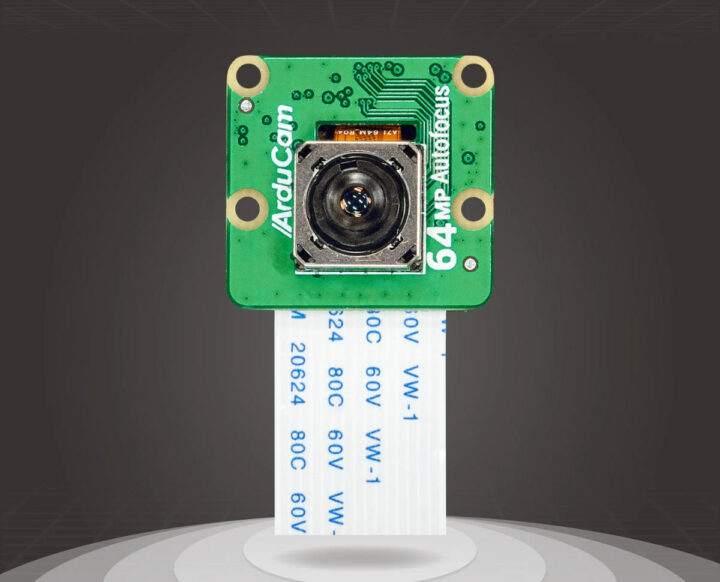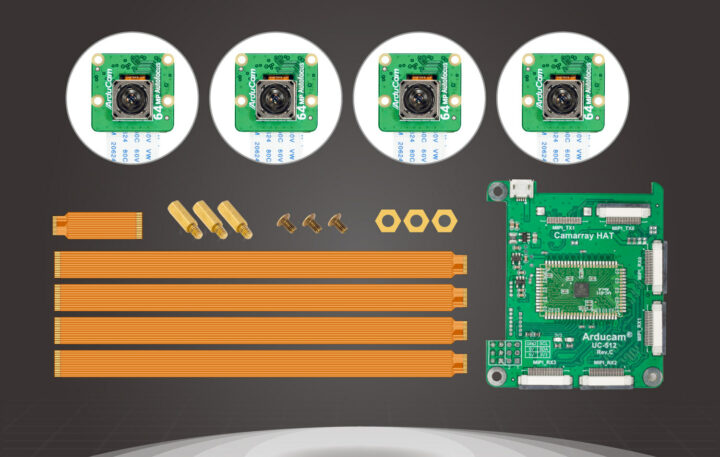Arducam Pi Hawk-eye is a 64MP “ultra-high resolution” camera for Raspberry Pi 4 or CM4 with built-in autofocus following the company’s 16MP autofocus camera introduced at the end of last year.
The new camera module will allow you to take still images at up to 9152 x 6944 resolution, but videos will still be limited to 1080p30 on the Raspberry Pi 4. The Pi Hawk-eye is also compatible with the official Raspberry Pi v1/v2 cameras, meaning you can reuse your enclosures/mounts, and keep on using the same software, for instance, libcamera.
Arducam Pi Hawk-eye specifications:
- Sensor – Sensor with 9152 x 6944 pixels resolution
- Still resolution – 64MP
- Video modes
- On Raspberry Pi – 1080p30, 720p60, and 640×480 @ 60/90fps
- Camera module – 1280×720 @ 120 fps, 1080p60, 2312×1736 @ 30 fps, 3840×2160 @ 20 fps, 4624×3472 @ 10 fps, 9152×6944 @ 2.7 fps
- Optical size – 9.25mm diagonal (7.4×5.5mm)
- Focal ratio – F1.8
- Focal length – 5.1 mm
- Focus Type – Manual or autofocus from 8cm to infinity
- FoV – 84° viewing angle (diagonal)
- Shutter type – Rolling
- Output format – JPEG, YUV, RGB, RAW10
- Dimensions – 25 x 24 mm
Note that while a Raspberry Pi 4 or Compute Module 4/4S is required for 64MP resolution, the previous generation Raspberry Pi (2/3/Zero W/Zero 2 W) boards can still be used with the camera but only up to 16MP. That means Arducam Pi Hawk-eye is mostly interesting for Broadcom BCM2711 (4x Cortex-A72) powered Raspberry Pi boards or modules, and is designed for taking still images since the maximum video resolution and framerate are the same as the 16MP camera. Future Raspberry Pi board may be able to take advantage of the higher video resolution and framerate enabled by the new camera module.
The company also offers a 64MP Quad-Camera Kit with an Arducam UC-512 expansion board and four 64MP Pi Hawk-eye camera modules that allows the user to take four high-resolution photos from a single Raspberry Pi 4 (almost) at the same time. Other accessories include a camera & cable extension kit using RJ45 ports and Cat-5 cable to extend the range of the camera, a pan-tilt kit, and a CSI-to-HDMI adapter set all shipping with one 64MP camera.
Arducam is taking pre-orders now with shipping expected in early May. The Pi Hawk-eye camera module sells for $35.99, the quad-camera kit for $194, the cable extension kit for $85.98, the pan-tilt kit for $62.98, and a CSI-to-HDMI adapter set for $49.98. As I understand it, all those are pre-order prices with a 40% discount, and prices should increase in May. Additional information may be found on the product page, where you’ll also find several still image samples taken with the camera.

Jean-Luc started CNX Software in 2010 as a part-time endeavor, before quitting his job as a software engineering manager, and starting to write daily news, and reviews full time later in 2011.
Support CNX Software! Donate via cryptocurrencies, become a Patron on Patreon, or purchase goods on Amazon or Aliexpress






